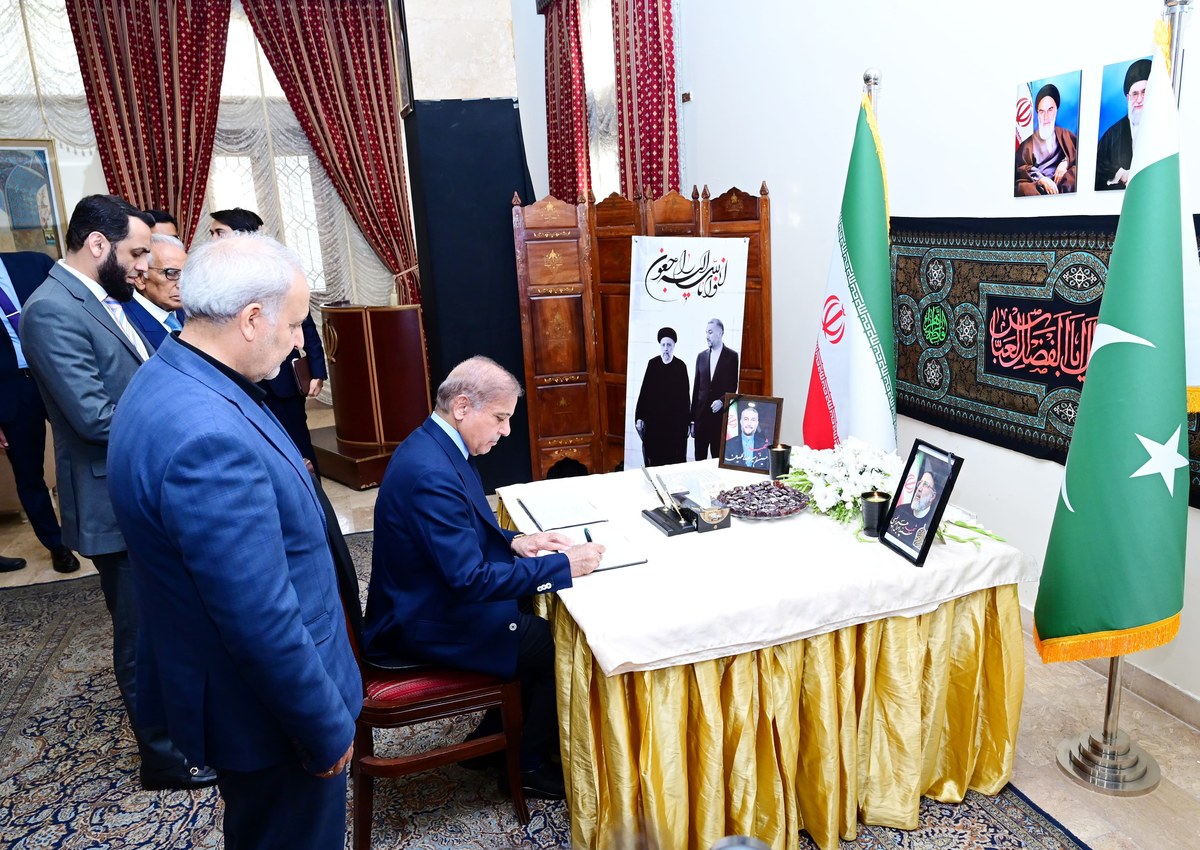ISLAMABAD: Pakistan Prime Minister Shehbaz Sharif on Monday visited the Iranian embassy in Islamabad to extend condolences over the death of President Ebrahim Raisi and other officials in a helicopter crash, the Iranian embassy said.
Iranian state news agency IRNA said Raisi, the country’s foreign minister and others were found dead at the site of the crash after an hours-long search through a foggy, mountainous region in the country’s northwest.
Raisi, 63, was traveling in Iran’s East Azerbaijan province. State TV said the “hard landing” happened near Jolfa, a city on the border with Azerbaijan, some 600 kilometers (375 miles) northwest of the Iranian capital, Tehran. Later, state TV put it farther east near the village of Uzi, but details remained contradictory.
Raisi was traveling with Foreign Minister Hossein Amirabdollahian, the governor of Iran’s East Azerbaijan province and other officials and bodyguards, according to state media. One local government official used the word “crash,” but others referred to either a “hard landing” or an “incident.”
“H.E. Mohammad Shahbaz Sharif, Honourable Prime Minster of the Islamic Republic of Pakistan, along with a delegation of high-ranking Pakistani officials attended at the embassy of the Islamic Republic of Iran to express sympathy and condolences to the government and people of Islamic Republic of Iran in consequent to the martyrdom of President Seyed Ebrahim Raisi, FM Hussain Amirabdollahian and their companion,” the Iranian embassy said in a statement.

Prime Minister Shehbaz Sharif visited the Embassy of the Islamic Republic of Iran in Islamabad on May 20, 2024 to offer condolences to Iranian Ambassador Raza Amiri Mughaddam on the death of Iranian President Dr. Ibrahim Raisi. (Photo courtesy:PMO)
Earlier in a post on X, Sharif extended his “deepest condolences” and sympathies to the people of Iran, hoping they would recover from the tragedy with courage.
“Pakistan will observe a day of mourning and the flag will fly at half-mast as a mark of respect for President Raisi and his companions and in solidarity with Brotherly Iran,” Sharif said.
President Asif Ali Zardari expressed “profound shock and sorrow” over Raisi’s death, a statement from his office said.
“Today, Pakistan mourns the loss of a great friend,” Zardari said. “Just last month we had the honor of hosting him in Pakistan. During our discussions, I found him very keen on strengthening our bilateral relationship.”
Zardari’s son and Pakistan Peoples Party (PPP) Chairman Bilawal Bhutto-Zardari expressed his heartfelt condolences over Raisi’s demise.
“Every Pakistani is deeply grieved over the saddest incident and stands in solidarity with their Iranian brethren,” Bhutto-Zardari said in a statement.
Deputy Prime Minister and Foreign Minister Ishaq Dar said he was “truly aggrieved” at Raisi’s passing. “Today Ummah has lost a great statesman,” he wrote on social media platform X. “Pakistan has lost a true friend.”
Pakistan’s foreign office issued a statement, saying it was shocked at Raisi’s demise.
“President Dr. Seyyed Ebrahim Raisi and Foreign Minister Hossein Amir-Abdollahian were esteemed leaders and statesmen whose contributions to their country and reinforcing Pakistan-Iran relations and regional cooperation will always be remembered,” the foreign office said.
The development takes place as the Middle East remains unsettled by Israel’s war on Gaza, during which Raisi under Supreme Leader Ayatollah Ali Khamenei launched an unprecedented drone-and-missile attack on Israel last month. Under Raisi, Iran enriched uranium closer than ever to weapons-grade levels, further escalating tensions with the West as Tehran also supplied bomb-carrying drones to Russia for its war in Ukraine and armed militia groups across the region.
Raisi was elected president at the second attempt in 2021, and since taking office ordered a tightening of morality laws, overseen a bloody crackdown on anti-government protests and pushed hard in nuclear talks with world powers.
In Iran’s dual political system, split between the clerical establishment and the government, it is the supreme leader rather than the president who has the final say on all major policies.
In April, Raisi arrived in Islamabad on a three-day official visit to Pakistan as the two Muslim neighbors sought to mend ties after unprecedented tit-for-tat military strikes earlier this year.
The Iranian president had held delegation-level meetings in the Pakistani capital as well as one-on-one discussions with Pakistan’s prime minister, president, army chief, Senate chairman and National Assembly speaker.
During the visit, Raisi had also overseen the signing of eight agreements between the two countries that covered different fields, including trade, science technology, agriculture, health, culture, and judicial matters.
















